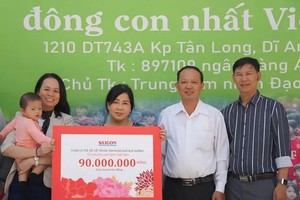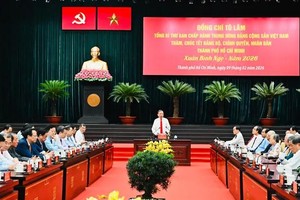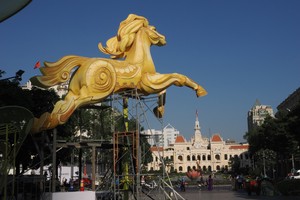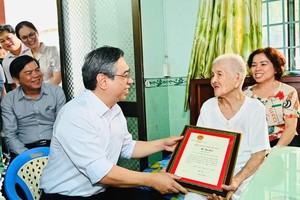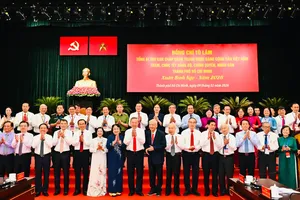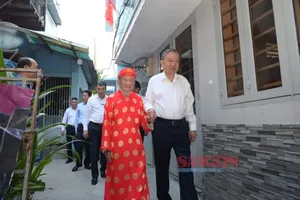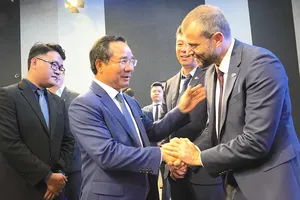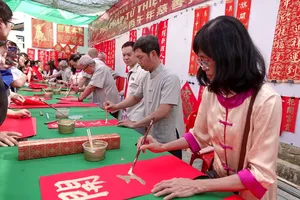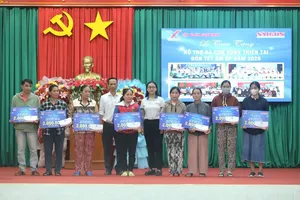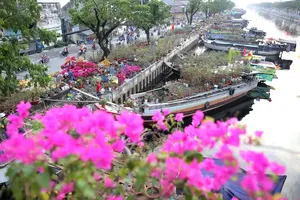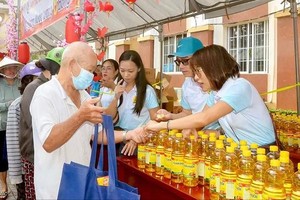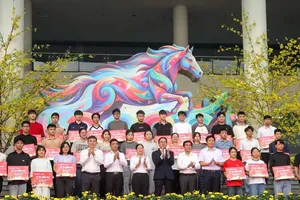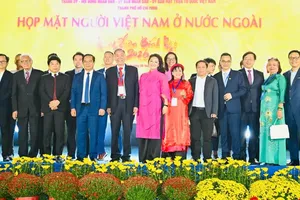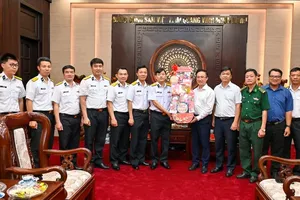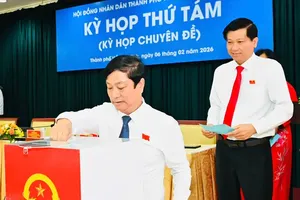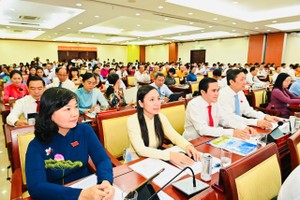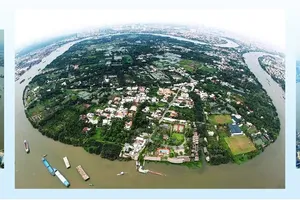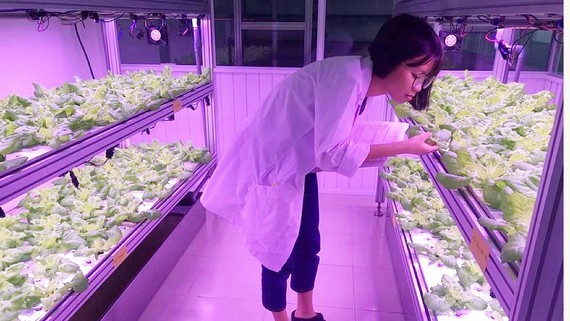 The model of hydroponic vegetable production in the laboratory of the University of Natural Sciences. (Photo: SGGP)
The model of hydroponic vegetable production in the laboratory of the University of Natural Sciences. (Photo: SGGP)
Lack of conditions for trial production
Assoc. Prof. - Dr. Le Thi Kim Phung, Sustainable Process Engineering Group of the HCMC University of Technology under the VNUHCMC, said that the agricultural sector had contributed greatly to the economy and export. Especially, agriculture plays an important role in national food security. However, this industry has been facing many challenges, such as pesticide overuse, problems with seedlings, and low application of high technologies to production, leading to losses and waste of up to US$3.9 billion per year.
Meanwhile, the research by the institute and the university are only carried out in small laboratories. There is not enough space for experimental production. For example, the Sustainable Process Engineering Group has researched many drugs and organic fertilizers but lacks the facilities to commercialize them in large quantities to meet the market demand. While in the market, imported goods are extremely expensive, making them difficult for farmers to access.
Dr. Nguyen Huu Hoang, Center for Research and Application of High Technology in Agriculture of the University of Natural Sciences under the VNUHCMC, said that the agricultural industry faced many challenges, such as low labor productivity due to unstable market, lack of strategic direction, lack of capital and basis technology, lack of highly-qualified human resources, small production scale, and loose legal background. Therefore, the application of high technology in agricultural research and production is an urgent matter.
Dr. Nguyen Huu Hoang cited that cantaloupe farmers face the situation that, when their melons are about to be ready for harvest, they contract a disease that causes rot and damage to both the fruit and vine. It is because high technology has not yet been applied to cantaloupe production. Using scientific and technical advances will help farmers avoid these diseases because the main cause is too much sun and too high temperatures. From this fact, the center proposed that there should be a high-tech agricultural center to train qualified human resources, associate with enterprises, and conduct research on seedlings, breeding stocks, and molecular pathology of plants to serve the agriculture in particular and the community in general.
According to Assoc. Prof. - Dr. Nguyen Phuong Thao, International University under the VNUHCMC, currently, the policy is to develop sustainable agriculture and circular agriculture to adapt to climate change. Therefore, the application of plant biotechnology to improve the quality and yield of plants and animals is necessary. However, due to the lack of linkages between scientists, farmers, and enterprises, the application of scientific and technical advances to agricultural production is difficult. Therefore, it is essential to build an area specializing in research, production, and commercialization of seed products, biological plant protection drugs, and biological fertilizers to serve businesses and farmers.
“We have not thought about big problems like gene research and new varieties. However, in the meantime, there must be a place for scientists to research and businesses to associate in solving the pressing needs of agriculture,” emphasized Assoc. Prof. - Dr. Nguyen Phuong Thao.
Effectively using investment capital
Assoc. Prof. - Dr. Vu Hai Quan, Director of VNUHCMC, said that based on the recommendations of scientists and enterprises and the reality of the agriculture, the university would assign the Science and Technology Department to develop a project to establish a high-tech agricultural incubator in the Urban Area of the VNUHCMC. From 2023 to 2025, VNUHCMC will spend VND1.2 trillion (US$51.93 million) to invest in specialized laboratories, promote research, and cooperate with businesses to deploy applications and commercialize researched products. Specifically, the high-tech agricultural incubator will be established and developed following the international model - conducting training and research, collaborating with enterprises for trial production, transfer, and commercialization of products, and serving agricultural production.
“It is a national strategic task, so when deciding to invest, we must commit to using it effectively to avoid wasting investment from the budget,” affirmed Assoc. Prof. - Dr. Vu Hai Quan.
According to Assoc. Prof. - Dr. Lam Quang Vinh, Head of Science and Technology Department under the VNUHCMC, there are currently 26 proposals from research groups with a total area of 7.6ha. Based on these proposals, the Science and Technology Department will develop a project to build a high-tech agricultural incubator following a model combining training, research, and association with enterprises and localities to apply to production. At the same time, it will cooperate with a project funded by the Korea International Cooperation Agency (KOICA) to sponsor more than US$9 million to develop highly-qualified agricultural human resources for the Mekong Delta region.
As a member university of VNUHCMC since 2019, Assoc. Prof. - Dr. Vo Van Thang, Rector of An Giang University, acknowledged that the matter of sustainable agricultural development had received attention and drastic direction of the Party and State. As a university located in the Mekong Delta, the task of researching to serve local agriculture is extremely important.
Assoc. Prof. - Dr. Le Thi Kim Phung, Sustainable Process Engineering Group of the HCMC University of Technology under the VNUHCMC, said that the agricultural sector had contributed greatly to the economy and export. Especially, agriculture plays an important role in national food security. However, this industry has been facing many challenges, such as pesticide overuse, problems with seedlings, and low application of high technologies to production, leading to losses and waste of up to US$3.9 billion per year.
Meanwhile, the research by the institute and the university are only carried out in small laboratories. There is not enough space for experimental production. For example, the Sustainable Process Engineering Group has researched many drugs and organic fertilizers but lacks the facilities to commercialize them in large quantities to meet the market demand. While in the market, imported goods are extremely expensive, making them difficult for farmers to access.
Dr. Nguyen Huu Hoang, Center for Research and Application of High Technology in Agriculture of the University of Natural Sciences under the VNUHCMC, said that the agricultural industry faced many challenges, such as low labor productivity due to unstable market, lack of strategic direction, lack of capital and basis technology, lack of highly-qualified human resources, small production scale, and loose legal background. Therefore, the application of high technology in agricultural research and production is an urgent matter.
Dr. Nguyen Huu Hoang cited that cantaloupe farmers face the situation that, when their melons are about to be ready for harvest, they contract a disease that causes rot and damage to both the fruit and vine. It is because high technology has not yet been applied to cantaloupe production. Using scientific and technical advances will help farmers avoid these diseases because the main cause is too much sun and too high temperatures. From this fact, the center proposed that there should be a high-tech agricultural center to train qualified human resources, associate with enterprises, and conduct research on seedlings, breeding stocks, and molecular pathology of plants to serve the agriculture in particular and the community in general.
According to Assoc. Prof. - Dr. Nguyen Phuong Thao, International University under the VNUHCMC, currently, the policy is to develop sustainable agriculture and circular agriculture to adapt to climate change. Therefore, the application of plant biotechnology to improve the quality and yield of plants and animals is necessary. However, due to the lack of linkages between scientists, farmers, and enterprises, the application of scientific and technical advances to agricultural production is difficult. Therefore, it is essential to build an area specializing in research, production, and commercialization of seed products, biological plant protection drugs, and biological fertilizers to serve businesses and farmers.
“We have not thought about big problems like gene research and new varieties. However, in the meantime, there must be a place for scientists to research and businesses to associate in solving the pressing needs of agriculture,” emphasized Assoc. Prof. - Dr. Nguyen Phuong Thao.
Effectively using investment capital
Assoc. Prof. - Dr. Vu Hai Quan, Director of VNUHCMC, said that based on the recommendations of scientists and enterprises and the reality of the agriculture, the university would assign the Science and Technology Department to develop a project to establish a high-tech agricultural incubator in the Urban Area of the VNUHCMC. From 2023 to 2025, VNUHCMC will spend VND1.2 trillion (US$51.93 million) to invest in specialized laboratories, promote research, and cooperate with businesses to deploy applications and commercialize researched products. Specifically, the high-tech agricultural incubator will be established and developed following the international model - conducting training and research, collaborating with enterprises for trial production, transfer, and commercialization of products, and serving agricultural production.
“It is a national strategic task, so when deciding to invest, we must commit to using it effectively to avoid wasting investment from the budget,” affirmed Assoc. Prof. - Dr. Vu Hai Quan.
According to Assoc. Prof. - Dr. Lam Quang Vinh, Head of Science and Technology Department under the VNUHCMC, there are currently 26 proposals from research groups with a total area of 7.6ha. Based on these proposals, the Science and Technology Department will develop a project to build a high-tech agricultural incubator following a model combining training, research, and association with enterprises and localities to apply to production. At the same time, it will cooperate with a project funded by the Korea International Cooperation Agency (KOICA) to sponsor more than US$9 million to develop highly-qualified agricultural human resources for the Mekong Delta region.
As a member university of VNUHCMC since 2019, Assoc. Prof. - Dr. Vo Van Thang, Rector of An Giang University, acknowledged that the matter of sustainable agricultural development had received attention and drastic direction of the Party and State. As a university located in the Mekong Delta, the task of researching to serve local agriculture is extremely important.
According to Assoc. Prof. - Dr. Vu Hai Quan, the High-tech Agricultural Incubator project must meet two requirements. Specifically, the research must accompany farmers and businesses in actual production and follow the guidelines and policies of the State on sustainable agricultural development. Research must lead, solve current pressing problems, and predict future requirements. Especially, the project must take into account the matter of spending on people and how to operate and exploit effectively projects.
